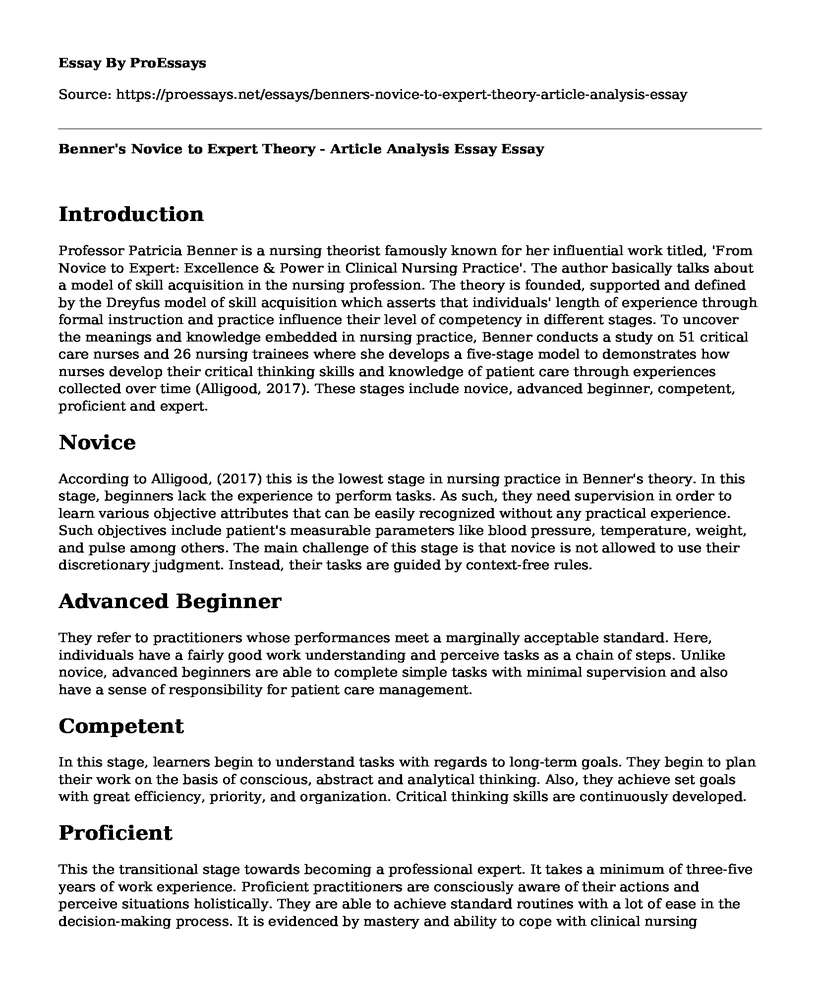Introduction
Professor Patricia Benner is a nursing theorist famously known for her influential work titled, 'From Novice to Expert: Excellence & Power in Clinical Nursing Practice'. The author basically talks about a model of skill acquisition in the nursing profession. The theory is founded, supported and defined by the Dreyfus model of skill acquisition which asserts that individuals' length of experience through formal instruction and practice influence their level of competency in different stages. To uncover the meanings and knowledge embedded in nursing practice, Benner conducts a study on 51 critical care nurses and 26 nursing trainees where she develops a five-stage model to demonstrates how nurses develop their critical thinking skills and knowledge of patient care through experiences collected over time (Alligood, 2017). These stages include novice, advanced beginner, competent, proficient and expert.
Novice
According to Alligood, (2017) this is the lowest stage in nursing practice in Benner's theory. In this stage, beginners lack the experience to perform tasks. As such, they need supervision in order to learn various objective attributes that can be easily recognized without any practical experience. Such objectives include patient's measurable parameters like blood pressure, temperature, weight, and pulse among others. The main challenge of this stage is that novice is not allowed to use their discretionary judgment. Instead, their tasks are guided by context-free rules.
Advanced Beginner
They refer to practitioners whose performances meet a marginally acceptable standard. Here, individuals have a fairly good work understanding and perceive tasks as a chain of steps. Unlike novice, advanced beginners are able to complete simple tasks with minimal supervision and also have a sense of responsibility for patient care management.
Competent
In this stage, learners begin to understand tasks with regards to long-term goals. They begin to plan their work on the basis of conscious, abstract and analytical thinking. Also, they achieve set goals with great efficiency, priority, and organization. Critical thinking skills are continuously developed.
Proficient
This the transitional stage towards becoming a professional expert. It takes a minimum of three-five years of work experience. Proficient practitioners are consciously aware of their actions and perceive situations holistically. They are able to achieve standard routines with a lot of ease in the decision-making process. It is evidenced by mastery and ability to cope with clinical nursing uncertainties.
Expert
Expert practitioners are highly skilled clinical nurses with numerous years of experience. They operate from a deep understanding and are able to recognize patterns without relying on analytical principles (Alligood, 2017). Expertise is demonstrated by the ability to go beyond existing interpretations in order to achieve excellent patient outcomes. Their intuition enables them to handle dynamic clinical situations.
Ideally, Benner's novice to expert model points out that despite academic background, nurses are not predefined in their area of specialization but rather gets defined in the course of experience. Experiences gained over time are critical to career development and growth.
References
Alligood, M. R. (2017). Nursing Theorists and Their Work-E-Book. Elsevier Health Sciences.
Cite this page
Benner's Novice to Expert Theory - Article Analysis Essay. (2022, Jul 08). Retrieved from https://proessays.net/essays/benners-novice-to-expert-theory-article-analysis-essay
If you are the original author of this essay and no longer wish to have it published on the ProEssays website, please click below to request its removal:
- Coursework Example: Diet and Activities for an Overweight Patient with Osteoporosis
- How Foods Labeled "Healthy" Can Still Make You Fat
- Paper Example on Community Health Assessment: Finding Loopholes for Health Improvement
- Essay on My Nursing Career Path: From Theater to Acute Care NP
- Essay on Health Care Reform: A Century of Failed Attempts and a New Hope
- Essay Sample on Health Considerations in Canada's Foreign Policy: Impact of Globalization
- Essay Example on Prescription Opioids and Their Unexpected Effects: A Reality Check







